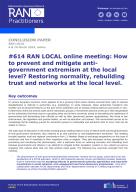Details
- Publication date
- 15 May 2023
- Author
- Directorate-General for Migration and Home Affairs
- RAN Publications Topic
- Local strategies/cities
Description
In various European countries, there appears to be a growing trend where citizens exercise their right to express dissatisfaction or distrust in authorities (e.g. protesting). In some instances, these sentiments transform into hostility due to perceived failures on the part of the authorities and an already existing distrust (warranted or not). Furthermore, there are several cases where individuals, groups or movements become so fed up or feel marginalised by the authorities that they resort to spreading false and divisive narratives aimed at discrediting the legitimacy of governments and demonising their officials as well as their (perceived) partner organisations, like those in law enforcement, the legislative and judicial bodies, as well as education and science.
This environment serves as an increasingly fertile breeding ground for extremist groups to manipulate and extremist acts to occur that can be violent in nature. The main topic of discussion in the online working group meeting held on 6 and 10 March 2023 was the phenomenon of anti-government extremism, also referred to as anti-authority or anti-establishment extremism.
The meeting brought together local and regional coordinators from 11 Member States to exchange perspectives on this type of extremism and how it manifests in their respective cities or regions. They also discussed various approaches for preventing and countering this phenomenon, with a particular focus on restoring normalcy and rebuilding trust between governments and citizens in an attempt to mitigate further escalation (violent or non-violent) as well as engaging with natural allies that can help achieve these goals.
The following key outcomes emerged from the meeting:
- The phenomenon of anti-government/authorities extremism remains hard to grasp, particularly from the perspective of a P/CVE approach, which is still inherently security-driven and ideology-focused. Restoring trust in authorities requires accepting failures in government/authority approaches and long-term investments in social cohesion, civic engagement and local democracy programmes. Long-term collaboration between P/CVE departments and other departments involved in in these programmes is necessary (a whole-of-society/holistic approach).
- It is crucial for all departments involved in the holistic approach to recognise the radicalising effects of anti-democratic narratives, especially those circulating within anti-government movements that promote traditionalist and misogynistic views. The same level of awareness should be placed on the significance of political actors using similar anti-democratic narratives.
- The need for online prevention remains. While there are still legal challenges to address, we can and should explore creative solutions, as already discussed within RAN. For instance, see RAN C&N (2022) Digital Frontrunners: Key challenges and recommendations for online P/CVE work.
- European movements are inspired by those in the US. As such, money flows (international) might be a topic to take a closer look into.
- - The fact that the extreme-right is attempting to manipulate legitimate protests and anti-government sentiments should remain a priority in a P/CVE approach on this issue.
- The question of ‘how to include the excluded’ remains a crucial question when discussing anti-government extremism. Civic engagement programmes, for example, tend to attract individuals who are already willing to engage to some extent. However, for those who feel excluded or isolated, any initiative to promote engagement with their group can be perceived as ‘part of the system’ and is therefore bound to fail.

